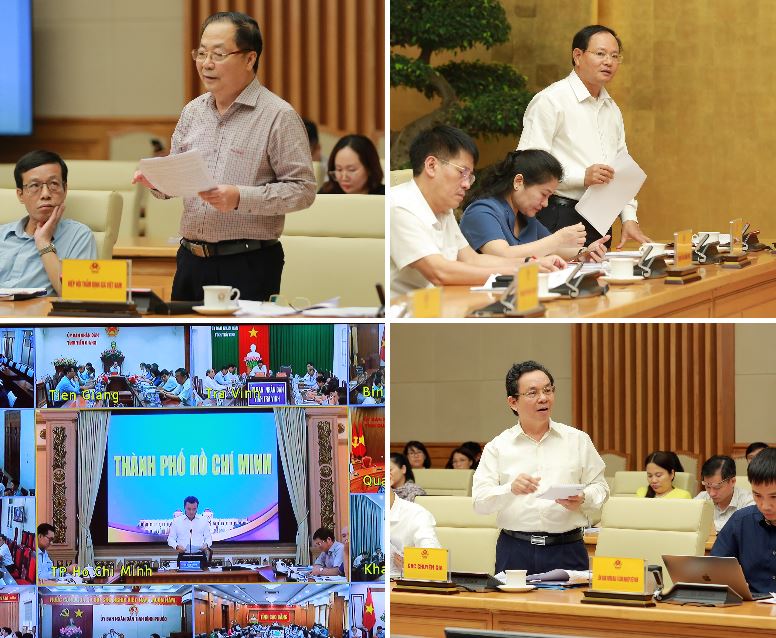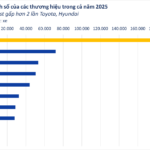
Deputy Prime Minister Tran Hong Ha requests a review to clarify the scope of the decrees guiding the implementation of the 2024 Land Law, ensuring no overlap or duplication – Photo: VGP/Minh Khoi
|
On the morning of May 8, Deputy Prime Minister Tran Hong Ha chaired a direct and nationwide online conference to gather opinions on the draft decrees detailing the compensation, support, and resettlement regulations when the state retrieves land, as well as the land pricing regulations.
Deputy Prime Minister Tran Hong Ha emphasized that the 2024 Land Law introduces numerous new and breakthrough policies and guidelines. Both local governments and the business community, as well as the people, share the common aspiration to promptly bring this law into practice.
The Prime Minister has instructed relevant ministries, sectors, and local governments to urgently develop decrees, circulars, and legal documents to guide the implementation of the Land Law, closely following and concretizing the contents that the Land Law entrusts the Government to guide.
According to the Deputy Prime Minister, the regulations on compensation, support, and resettlement when the state retrieves land are crucial and sensitive policies that aim to ensure fairness and social welfare. These regulations allow people to participate and benefit from the development process, harmonizing the interests of all parties involved in project implementation.
The land pricing regulations must guarantee objectivity and transparency and balance land-related revenues among the state, people, and businesses. These regulations should also prevent land price surges and consider the input costs for socio-economic development projects.
The contents that require further discussion in the draft decree on compensation, support, and resettlement when the state retrieves land include: general contents of the project and detailed contents regarding compensation, support, and resettlement for each organization, household, and individual; land compensation in the form of land with a different purpose of use or housing; other cases eligible for land compensation and the conditions for such compensation; subjects entitled to receive support for stable livelihood; subjects entitled to receive support for vocational training, career transition, and job seeking; resettlement arrangement for those who voluntarily donate land-use rights to the state for the implementation of traffic, irrigation, technical infrastructure, and social infrastructure projects; resettlement arrangement for those with residential land retrieval in a land lot with a house and who wish to resettle on the spot; subjects eligible for deferred payment of land use levy when allocated with resettlement land; and expenses to ensure the effective organization of compensation, support, and resettlement.

Experts and local leaders contribute opinions to ensure the feasibility of compensation, support, resettlement, and land pricing policies – Photo: VGP/Minh Khoi
|
Experts and representatives from several real estate associations provided their insights on the contents of the draft decree on land pricing, including: prioritizing information sources when selecting comparable land plots for the comparative approach; total costs and total revenues of the investor when applying the surplus method; applying the land pricing method for transitional cases; selecting organizations to perform land pricing; procedures and contents for building the land price framework; and procedures and contents for specific land pricing.
Deputy Prime Minister Tran Hong Ha highly appreciated the efforts of ministries, sectors, and local governments in developing the detailed documents for the implementation of the Land Law by July 1, 2024, which is five months earlier than the deadline specified in the law (January 1, 2025). He emphasized that “quality and effectiveness are of utmost importance.”
In addition to fully incorporating the opinions raised during the meeting, the Deputy Prime Minister requested the Ministry of Natural Resources and Environment to continue working with experts, real estate associations, and local governments to clarify the theoretical and practical basis, as well as the feasibility of applying new policies and methods for land pricing. This ensures clarity, simplicity, and coherence to protect those engaged in land pricing work.
Regarding compensation, support, and resettlement, the Deputy Prime Minister emphasized the need for consistent and fair policies with state regulation, ensuring that no subjects are overlooked. He also highlighted the importance of promptly institutionalizing proven effective regulations and practical experiences, such as those gained from land retrieval and resettlement processes during the implementation of key transport projects in the past.
“The Ministry of Natural Resources and Environment, the Ministry of Finance, and local governments need to propose solutions and procedures for retrieving public land and interspersed land, protecting state assets, and harmonizing the interests of enterprises,” said the Deputy Prime Minister.
The Deputy Prime Minister assigned the Ministry of Natural Resources and Environment, the Ministry of Agriculture and Rural Development, and the Ministry of Finance to review and clarify the scope of the decrees guiding the implementation of the 2024 Land Law, adhering to the assigned level of authority without overlap or duplication.
Local governments and real estate associations were urged to mobilize enterprises and independent experts to proactively contribute opinions, provide feedback, and propose solutions to ensure the clarity, feasibility, and smoothness of the regulations.












